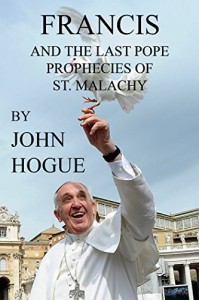

Will Pope Francis be the final pope? Will the years of his pontificate be the years of tribulation that lead to the Apocalypse and God's final judgement of humanity?
Those are the questions addressed by prophecy scholar John Hogue in his book: Francis and the Last Pope Prophecies of St. Malachy. This book is a primer on evaluating the St. Malachy Prophecies that count down the popes to the Apocalypse. In it, Mr. Hogue also points out the controversies and contradictions of the Roman Catholic Church, the pageantry and ritual of the pope selection process, and the portents that accompanied that process for the current Pope Francis (formally Cardinal Jorge Bergoglio). He also points out how many of our ideas about Jesus and Christianity (the virgin birth, a bearded Jesus, celibacy for priests, even the resurrection) are the results of the "Romanization" of Christianity. This is interesting material in itself and it provides a context for the St. Malachy material that should help the discerning reader decide whether Pope Francis is indeed the last pope before the End Times kick in.
Mr. Hogue's book examines an old document of "111 mysterious Latin mottoes followed by an apocalyptic coda forecasting the succession of popes unto Judgment Day." Legend says it was produced from the ecstatic utterances of St. Malachy (an Irish Prelate) around 1140 when he arrived at Rome at the end of a pilgrimage. Malachy gave his prophecies to the pope of that time, Innocent II, who then stored them in the Vatican vaults where they stayed until they were rediscovered in the late 16th century. Mr. Hogue points out that the first 76 mottoes are 100 percent accurate in describing those popes before 1595. He believes these were written after the fact, "sometime after 1557." That makes the remaining 35 mottoes to be actual attempts at foretelling the future, and as such, they are remarkable. Mr. Hogue judges them to have a "success rate" of about 89 percent at identifying future popes (relative to 1557 or so).
St. Malachy's (or whomever's) mottoes are just that--short phrases seldom more than three words in length. For example, #79 reads in English, "A Perverse People" and #83 reads, "Guardian of the Mountains." Each is supposed to identify the specific pope for that point in the succession of popes from St. Peter (although whether #1 actually identifies St. Peter, the disciple of Christ, is not noted). The identification of a given pope is derived from the associated motto by considering 11 prophetic clues. One or more of them should work to explain how the motto uniquely fits the man elected pope. Mr. Hogue explains this process in chapters Two and Four.
In chapter Two, Mr. Hogue lists the prophetic clues and gives examples of how they work with the mottoes to identify popes. In Chapter Four, he takes each of the 35 genuinely prophetic mottoes, starting with #77 ("A Roman Cross" identifying Clement VIII 1592-1605), and describes how they identify (a hit) or fail to identify (a miss) the associated pope. He goes all the way to #111 ("From the Glory of the Olive" identifying Benedict XVI 2005-?). The last motto is actually a paragraph coda that identifies the final pope. These chapters make for a compelling read. Mr. Hogue's knowledge of prophecy, history, and Latin lend credence to his examination of the mottoes. The many hits and few misses he describes should leave all but the most skeptical of readers with an appreciation for the outstanding nature of the St. Malachy document.
In chapters Five through Eight, Mr. Hogue offers some discussion on the pontificates of the latest popes, Catholic vs non-Catholic ideas about the Apocalypse, some positive thoughts about Pope Francis and whether Nostradamus identified him. In Chapter Nine, he gets to the main question: Is Pope Francis the last pope?
I won't give away Mr. Hogue's answer, but in considering it, you should bear in mind the fluid nature of prophecy and precognition. Seers may be seeing a particular future happening, but these events can change if factors leading up to them change, such as enough desire to make sure they don't happen. From such come prophetic misses, making the accuracy of the St. Malachy prophecies all the more amazing. It would seem that only a few men with destinies to be pope, didn't make it.
So if we're dealing with some real prophecy here, what do we make of it? It seems to me that the preponderance of the world's prophetic literature comes down to a time of unprecedented calamity followed by either human extinction or a turn to enlightened, sustainable living on the earth. The importance of the St. Malachy prophecies is that they seem to provide a specific time for this final time. The countdown of popes is a pretty definite clock and it is lent much credence from just being so accurate. Hence, the importance of this book that presents that timeline in its historic and prophetic context. It is another validation that we are living at a hugely momentous point in the long human drama.
Francis and the Last Pope Prophecies of St. Malachy is a little book that deals with a big subject, namely, the fate of humanity. For if the seer behind St. Malachy's prophecies has it right, we've reached the end of history: Yeshua will return to set us straight, or we'll pass through the fire that will prompt us to set ourselves straight, or we'll go extinct. Such are the ponderings prompted by prophecies, the events of our time, and whether Pope Francis is the last pope.

 1
1








